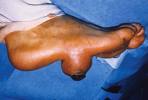|
|
|
|
Epithelioid sarcoma is a rare mesenchymal soft tissue tumor with an epithelioid pattern. It often
occurs in the extremities of young people. Diagnosis is often delayed because of the unusual nature of the tumor. HISTORY:
It is sometimes said that this tumor was first described in 1970 (Hautarzt 1990;41:562). However, surgeons at M.D. Anderson
cancer center in Houston have been treating it since at least 1961 (Arch Surg 1991;126:1485). In fact, in 1874 Prof. Zahn
described a "sarcoma epithelioides," which from the description sounds very similar to the present disease.
METASTASES: Unlike most sarcomas, lymph node metastases are common in epithelioid sarcoma. The lung is the most common site of distant metastases. Bone and brain metastases have also been recorded. In a 1978 survey, 5 out of 22 patients had vascular invasion from this tumor. RARITY: To demonstrate how rare this tumor is, the world's largest private cancer center, Memorial Sloan-Kettering (N.Y.), which has an international reputation as a center for the treatment of rare malignancies, saw a total of 16 such patients between 1982 to 1995, little more than one per year. Eleven of these (69 percent) were male; five (31 percent) female. The average age at diagnosis was 33 years. The length of time that symptoms were noted before a diagnosis was finally made was 18 months. Similarly, in 11 years, doctors at the St. Jude Children's Research Hospital, in Memphis (which also specializes in the treatment of rare cancers) treated a total of 8 such cases. APPEARANCE: An epithelioid sarcoma is usually first seen as a small, firm nodule in the subcutaneous tissue (below the skin). Some doctors say that these tumors are most common in the extremities, especially the fingers, hands, and wrist. The tumor characteristically has multiple recurrences, usually appearing along either a pathway of tendons or of fascial planes. At Memorial Sloan-Kettering they found that tumors were first seen in the trunk in 44 percent of cases, in the lower extremities in 31 percent, and in the upper extremities in 25 percent. At that center, the median follow-up time was 45 months. (Frequent follow-up is definitely called for.) Sixty-nine percent of patients experienced at least one local recurrence of the tumor. There were metastases to regional lymph nodes during the course of the disease in 44 percent and to the lungs in an equal percentage of cases.
[ Back ] |
|
|
|
